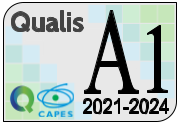Educar para empreender e inovar
A experiência de um hackathon acadêmico
DOI:
https://doi.org/10.21723/riaee.v19i00.18310Palavras-chave:
Educação, Empreendedorismo, Inovação, Hackathon, EngenhariaResumo
O presente trabalho estudou um hackathon acadêmico e como as universidades podem promover o empreendedorismo que transcenda a experiência acadêmica, considerando a percepção de estudantes que decidiram criar uma startup. Pesquisa de natureza qualitativa, teve como campo o evento promovido pela Universidade Texas A&M (EUA), com componentes da COPPE/UFRJ e do CEFET-RJ. A coleta de dados aconteceu por meio de entrevistas semiestruturadas e grupos focais. Percebeu-se que a iniciativa empreendedora foi motivada pela experiência vivida no evento, uma vez que a universidade não ofereceu educação para o empreendedorismo e nem suporte à iniciativa de empreender do grupo. Constatou-se que hackathons estimulam a inovação, mas são insuficientes no fomento ao empreendedorismo. Propõe-se um Programa de Desenvolvimento de Startups para que as universidades auxiliem o processo de inovação, construindo estruturas de apoio para estudantes em etapas posteriores aos eventos, fortalecendo uma formação que contemple o educar para empreender e inovar.
Downloads
Referências
BARDIN, L. Análise de conteúdo. Lisboa: Edições 70, 1977.
BERGMANN, J. Aprendizagem invertida para resolver o problema do dever se casa. 1. ed. Porto Alegre: Penso, 2018.
BOEHM, R. Aggies Invent: How an Intensive Design Experience Teaches an Entrepreneurial Mindset. Advances in Engineering Education, American Society for Engineering Education, 2020. Disponível em: https://advances.asee.org/wp-content/uploads/vol08/issue01/Papers/AEE-26-Boehm.pdf. Acesso em: 15 jul. 2023.
BRISCOE, G.; MULLIGAN, C. Digital Innovation: the hackathon phenomenon. London: Creative Works London Working Paper, 2014
BRAGA, M.; SCHETTINI, C. Collective intelligence in robotics labs: Mapping the flows of information. In: SEFI ANNUAL CONFERENCE - EUROPEAN SOCIETY FOR ENGINEERING EDUCATION, BUDAPEST, 47., 2019. Budapest. Anais […]. Budapest: University of Budapest, 2019. p. 36-36.
BRAGA, M.; GUTTMANN, G. The Knowledge Networks in a Makerspace: the Topologies of Collaboration, International Journal of Science and Mathematics Education, [S. l.], v. 17, p. 13–30, 2019. Disponível em: https://link.springer.com/article/10.1007/s10763-019-09954-7. Acesso em: 15 jul. 2023.
CALLON, M. The sociology of an actor-network: The Case of the Electric Vehicle. In: CALLON, M.; LAW, J.; RIP, A. (ed.) Mapping the Dynamics of Science and Technology. London: Palgrave McMillan, 1986.
CHENG, Y.; WANG, K.; LEE, I. Application of engineering education in entrepreneurship construction system. Eurasia Journal of Mathematics, Science and Technology Education, [S. l.], v. 14, n. 6, p. 2185-2191, 2018. DOI: 10.29333/ejmste/86963. Disponível em: https://www.ejmste.com/article/application-of-engineering-education-in-entrepreneurship-construction-system-5420. Acesso em: 15 jul. 2023.
DEVPOST: The home for hackathons. Disponível em: https://devpost.com. Acesso em: 19 jan. 2023.
DIN, B. H.; ANUAR, A. R.; USMAN, M. The Effectiveness of the Entrepreneurship Education Program in Upgrading Entrepreneurial Skills among Public University Students. Procedia - Social and Behavioral Sciences, [S. l.], v. 224, p. 117–123, 2016. DOI: 10.1016/j.sbspro.2016.05.413. Disponível em: https://www.sciencedirect.com/science/article/pii/S1877042816304979. Acesso em: 15 jul. 2023.
DRUCKER, P.F. Innovation and Entrepreneurship: Practice and Principles. New York: Harper Ed, 1993.
FAUSTINO DA SILVA, C. M.; CORRÊA, J. S.; LEITE, D. B.; CAIRES, R. T.; TEIXEIRA, C. S. (2021). Análise das incubadoras universitárias na estrutura organizacional das instituições de ensino superior do Brasil. In: CONFERÊNCIA ANPROTEC DE EMPREENDEDORISMO E AMBIENTES DE INOVAÇÃO, 31., 2021, Brasília. Anais [...]. Brasília, DF: [s. n.], 2021. p. 10-23.
FOSTER, M. Trucking & freight broker business startup 2021-2022: survival guide to start from scratch, grow quickly, and maintain sustainably your own company in the long term. London: Routledge, 2021.
GAMA, K.; ALENCAR GONÇALVES, B.; ALESSIO, P. Hackathons in the formal learning process. In: RÖBLING, G.; SCHARLAU, B. (ed). Proceedings of the 23rd Annual ACM Conference on Innovation and Technology in Computer Science Education. New York: [s. n.], 2018. p. 248–253.
GARCÍA, J. C. S.; WARD, A.; HERNÁNDEZ, B.; FOREZ, J. L. Educación emprendedora: estado del arte entrepreneurial education: state of the art. Propósitos y Representaciones, [S. l.], v. 5, n. 2, p. 401–473, 2017. Disponível em: https://revistas.usil.edu.pe/index.php/pyr/article/view/190. Acesso em: 5 jul. 2023.
GIBB, A. In pursuit of a new “enterprise” and “entrepreneurship” paradigm for learning: creative destruction, new values, new ways of doing things and new combinations of knowledge. International Journal of Management Reviews, [S. l.], v. 4, n. 3, p. 233–269, 2002. DOI: 10.1111/1468-2370.00086. Disponível em: https://onlinelibrary.wiley.com/doi/10.1111/1468-2370.00086. Acesso em: 15 jul. 2023.
HARFST, K. The Evolution and Implications of Entrepreneurship Curriculum at Universities. Online Journal for Workforce Education and Development, [S. l.], v. 1, n. 3, 2010. Disponível em: https://opensiuc.lib.siu.edu/ojwed/vol1/iss3/3/. Acesso em: 15 jul. 2023.
JOSHI, R. Entrepreneurship education: core, context and challenges. Journal of Entrepreneurship and Management, [S. l.], v. 3, n. 2, 2014. Disponível em: http://www.publishingindia.com/GetBrochure.aspx?query=UERGQnJvY2h1cmVzfC8yMjQ1LnBkZnwvMjI0NS5wZGY=. Acesso em: 15 jul. 2023.
KIRBY, D. A. Entrepreneurship education: can business schools meet the challenge? Education + Training, [S. l.], v. 46, n. 8/9, p. 510–519, 2004. DOI: 10.1108/00400910410569632. Disponível em: https://www.emerald.com/insight/content/doi/10.1108/00400910410569632/full/html. Acesso em: 15 jul. 2023.
LACKÉUS, M. Entrepreneurship in education: hat, why, when, how. Treto, Italy: Background paper for OECD-LEED, 2015, Disponível em: https://www.oecd.org/cfe/leed/BGP_Entrepreneurship-in-Education.pdf.
LEWRICK, M.; OMAR, M. ROBERT, R.; SAILER, K. Education for entrepreneurship and innovation: “management capabilities for sustainable growth and success”. World Journal of Entrepreneurship, Management and Sustainable Development, [S. l.], v. 6, n. 1/2, p. 1–18, 2011. DOI: 10.1108/20425961201000001. Disponível em: https://www.researchgate.net/publication/235307366_Education_for_entrepreneurship_and_innovation_Management_capabilities_for_sustainable_growth_and_success. Acesso em: 15 jul. 2023.
MACK, N.; WOODSONG, C.; MACQUEEN, K.; GUEST, G.; NAMEY, E. Qualitative research methods: a data collector’s field guide. Family Health International (FHI), USA, 2005. Disponível em: https://pdf.usaid.gov/pdf_docs/PNADK310.pdf. Acesso em: 15 jul. 2023.
MITCHELMORE, S.; ROWLEY, J. Entrepreneurial competencies: a literature review and development agenda. International Journal of Entrepreneurial Behavior & Research, [S. l.], v. 16, n. 2, p. 92–111, 2010. DOI: 10.1108/13552551011026995. Disponível em: https://www.emerald.com/insight/content/doi/10.1108/13552551011026995/full/html. Acesso em: 15 jul. 2023.
MORGAN, D. L. Focus groups as qualitative research. Los Angeles: SAGE Publications, 1997.
MWASALWIBA, E.S. Entrepreneurship education: a review of its objectives, teaching methods, and impact indicators. Education + Training, [S. l.], v. 52, n. 1, p. 20–47, 2010. DOI: 10.1108/00400911011017663. Disponível em: https://www.emerald.com/insight/content/doi/10.1108/00400911011017663/full/html. Acesso em: 15 jul. 2023.
McCALLUM, E.; WEICHT, R.; McMULLAN, L.; PRICE, A. EntreComp into Action - Get inspired, make it happen: A user guide to the European Entrepreneurship Competence Framework. Luxembourg: Publications Office of the European Union, 2018.
NABI, G.; LIÑÁN, F.; FAYOLLE, A.; KRUEGER, N.; WALMSLEY, A. The impact of entrepreneurship education in Higher Education: a systematic review and research agenda. Academy of Management Learning & Education, [S. l.], v. 16, n. 2, p. 277–299, 2017. DOI: 10.5465/amle.2015.0026. Disponível em: https://journals.aom.org/doi/10.5465/amle.2015.0026. Acesso em: 15 jul. 2023.
NECK, H. M., NECK, C. P.; MURRAY, E. L. Entrepreneurship: the practice and mindset (Second). Los Angeles: SAGE Publications, 2020.
ONU BRASIL. Os Objetivos de Desenvolvimento Sustentável no Brasil. Nações Unidas Brasil, 2022. Disponível em: https://brasil.un.org/pt-br/sdgs. Acesso em: 07 jun. 2022.
RIDLEY, D.; DAVIS, B.; KOROVYAKOVSKAYA, I. Entrepreneurial Mindset and the University Curriculum. Journal of Higher Education Theory and Practice, [S. l.], v. 17, n. 2, p. 79, 2017. Disponível em: https://articlearchives.co/index.php/JHETP/article/view/2079. Acesso em: 15 jul. 2023.
ROBLES, L.; ZÁRRAGA-RODRÍGUEZ, M. Key Competencies for Entrepreneurship. In: Proceedings of 2nd Global Conference on Business, Economics, Management and Tourism, Prague, Czech Republic, [S. l.], v. 23, p. 828–832, 2015. DOI: 10.1016/S2212-5671(15)00389-5. Disponível em: https://www.researchgate.net/publication/282555235_Key_Competencies_for_Entrepreneurship. Acesso em: 15 jul. 2023.
SCHUMPETER, A. J. Capitalism, socialism and democracy. New York: Routledge, 1994.
SCHWABER, K.; SUTHERLAND, J. The scrum guide the definitive guide to scrum: the rules of the game. 2020. Disponível em: https://scrumguides.org/docs/scrumguide/v2020/2020-Scrum-Guide-US.pdf#zoom=100. Acesso em: 15 jan. 2023.
SOGUNRO, O. A. Efficacy of role‐playing pedagogy in training leaders: some reflections. Journal of Management Development, [S. l.], v. 23, n. 4, p. 355–371, 2004. DOI: 10.1108/02621710410529802. Disponível em: https://www.emerald.com/insight/content/doi/10.1108/02621710410529802/full/html. Acesso em: Acesso em: 15 jul. 2023.
SREENIVASAN, A.; SURESH, M. Twenty years of entrepreneurship education: a bibliometric analysis. Entrepreneurship Education, [S. l.], v. 6, p. 45–68, 2023. Disponível em: https://link.springer.com/article/10.1007/s41959-023-00089-z. Acesso em: 15 jul. 2023.
SUTHERLAND, Jeff; SUTHERLAND, J.J. Scrum: The Art of Doing Twice the Work in Half the Time. Rio de Janeiro: Editora Sextante, 2014.
WARNER, J.; GUO, P. J. Hack.edu: examining how college hackathons are perceived by student attendees and non-attendees. In: TENENBER, J.; CHINN, D.; SHEARD, J.; MALMI, L. (ed.). Proceedings of the 2017 ACM Conference on International Computing Education Research. New York: ACM, 2017.
Downloads
Publicado
Como Citar
Edição
Seção
Licença
Copyright (c) 2024 Frederico Pifano de Rezende, Afsaneh Hamedi d'Escofier, Marco Braga

Este trabalho está licenciado sob uma licença Creative Commons Attribution-NonCommercial-ShareAlike 4.0 International License.
Manuscritos aceitos e publicados são de propriedade dos autores com gestão da Ibero-American Journal of Studies in Education. É proibida a submissão total ou parcial do manuscrito a qualquer outro periódico. A responsabilidade pelo conteúdo dos artigos é exclusiva dos autores. A tradução para outro idioma é proibida sem a permissão por escrito do Editor ouvido pelo Comitê Editorial Científico.








